Thanks to Larry for some clarification on this topic.
Introduction
Without a doubt the best documentary about M*A*S*H and one of the best documentaries about a television series ever, “Making M*A*S*H” was a documentary in the truest sense of the term: it documented the creation of an episode of the series from conception to post-production. “Making M*A*S*H” was the brainchild of Michael Hirsh, who produced and wrote the ninety-minute program for WTTW, a Chicago-based public television (PBS) station. It was shot during the production of two episodes from Season 8 (“Old Soldiers” and “Lend a Hand”) which originally aired in January 1980.
Mary Tyler Moore served as narrator for “Making M*A*S*H” when it was originally broadcast on Wednesday, January 21st, 1981 on PBS stations across the country.
It began with the following text: “This program is dedicated to the millions of television viewers who see M*A*S*H as proof that the vast wasteland can be made to bloom. And who week after week ask, ‘How do they do that?’.” And thus, the genesis of “Making M*A*S*H” is exposed: a documentary attempting to explain how the series that had captivated American audiences for nine years was made. Featuring in-depth interviews with the creative staff, including Alan Alda, Larry Gelbart, Gene Reynolds and Burt Metcalfe, as well as behind-the-scenes footage, it was a fascinating look at the creation of a television series.
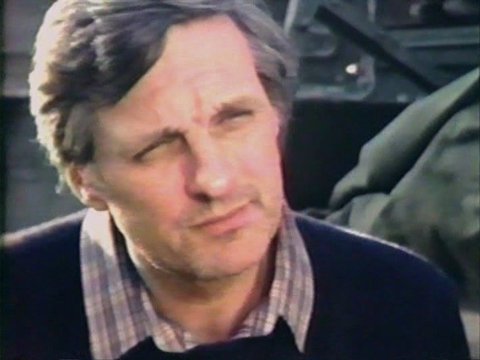
The title of the documentary was taken from the scenes within, the actors, crew and production staff at work making M*A*S*H. Behind the scenes footage from the filming of the aforementioned episodes from Season Eight was interspersed with interviews featuring both the cast and crew, along with a healthy dose of clips from past episodes.
In The Beginning
As the documentary began, Alan Alda talked about the reservations he had about joining M*A*S*H and Larry Gelbart discussed how the network reacted to the series.
“While the network displayed the typical sort of fears about language and permissiveness to a certain degree, they were always very supportive about the series politically. There was never any attempt to say let’s tone it down in terms of criticizing the military, the government. They knew what we were up to, very quickly, and never challenged that.”
Larry Gelbart
Everyone involved with the series realized that they owed a great debt to the film version. Without it, no network would have picked up the series. Alda gave thanks to Robert Altman and his film version for giving them a “visual style” and “setting” which allowed them to take the concept and run with it.
Of course, given the differences between a film and a television series, it was impossible to recreate some of the aspects of the film on the small screen. Gene Reynolds spoke of the how the network had discouraged the use of the OR, or operating room, because the small screen didn’t allow for such a gory depiction of surgery.
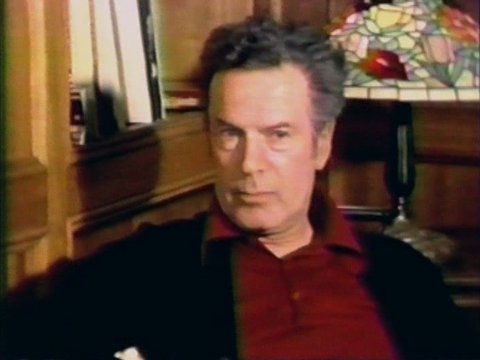
On the other hand, Reynolds knew that they had to show the surgeons doing what they did best, saving lives, in order to create a balance for the show between hilarity and drama. The episode that changed everything came midway through the first season, “Sometimes You Hear The Bullet.” During the course of the episode, Hawkeye loses a good friend and he breaks down. The severity of the subject matter was a change of pace for M*A*S*H.
The Wonderful Cast & Crew
One unique thing about M*A*S*H is the fact that everyone involved, both the cast and the crew, love what they do. According to Kellye Nakahara, who played Nurse Kellye, “To have a tense day on this set, occurs, but it is the occasion, it is not the usual thing.” And not only are they loving what they do but the folks at M*A*S*H want to make the show better, every moment of every day. M*A*S*H was always about the characters and thus the writers always took an interest in making the characters real, in making the characters feel like real people, three-dimensional people, people that could exist outside the world of television.
McLean Stevenson Leaves
It took three years for the series to become a hit but M*A*S*H did it. And after those three years, McLean Stevenson wanted to leave. With him would go his character, the beloved Henry Blake. The writers saw an opportunity and seized it. The tragic, and senseless, death of Henry Blake became a cornerstone of the series. The response to the episode was intense and immediate. Both Reynolds and Gelbart spoke of how the show received letters and phone calls from people who thought the episode was “cheap” or “exploitative,” because M*A*S*H was a situation comedy. Nobody expected to see a character die like that. Some of the letters were from people who understood. Many were from people who didn’t.
At first, Reynolds and Gelbart began to hand write responses to the letters. Gelbart himself wrote three or four hundred. Eventually, the volume of response was such that a form letter was created and the two simply signed the letters. In all, probably more than one thousand letters were received.
And it wasn’t just the viewers who were upset. The network was upset. According to Gelbart, in one repeat broadcast of “Abyssinia, Henry,” CBS cut off the end scene. And 20th Century Fox was upset as well, saying that killing off a character the way Henry Blake was killed off simply wasn’t right. Following McLean Stevenson’s departure, Wayne Roger also left. Was M*A*S*H coming to an end? Could the series recover from two actors, and two pivotal characters, leaving the show? It could and it did.
The Laugh Track
The producers of M*A*S*H fought tooth and nail against the laugh track on their series. Reynolds and Gelbart felt that the laugh track was inappropriate. During the fourth season, CBS actually considered dropping the laugh track. One of M*A*S*H‘s most famous episodes didn’t have a laugh track: “The Interview.” It was actually a last minute episode, ordered by the network at the end of the season. Gelbart and Reynolds remembered seeing a documentary produced during the actual Korean War in which a journalist went to Korea and asked lots of questions. Taking that idea and applying it to M*A*S*H, the two began to write down questions.
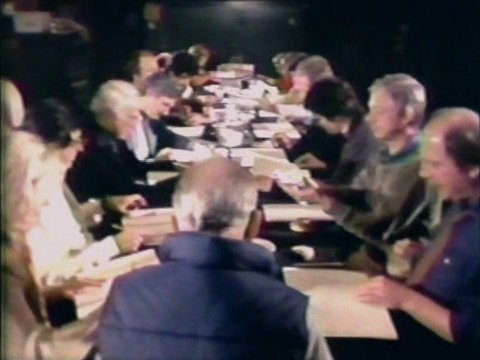
The episode was shot and produced and delivered to CBS. And then the script was written. The entire episode was improvised, with the actors answering questions themselves, in character. Several of the writers for M*A*S*H spoke of how easy it was to write for the series. They could write dialogue knowing that the actors could take those lines and make them their own.
Crafting an Individual Episode
Typically, scripts for M*A*S*H were written and then taken to a story conference, where they were hashed out and broken down. Following the story conference, the scripts go to the read through stage, where the actors and actresses read through the script, in character. The cast had the option, if they felt something could use improvement or needs to be worked on, to ask for rewrites.
Alan Alda and Mike Farrell spoke about the seventh season episode “Preventive Medicine.” In their opinion, the episode contained one of the best scenes of the season. In the episode, Hawkeye decides to operate on a healthy soldier, so that the man will lose his battalion and thus be unable to send additional causalities to the 4077th, saving lives. This idea of taking something healthy out of a healthy person disgusts B.J. It also disgusted Mike Farrell. The episode, which was based on a real event, became an intense confrontation between the two character. Hawkeye, stressed and tired, does what he thinks is right and goes through with the operation. B.J. can’t agree with his friend’s decision and sits it out. The fight became a moot point when more causalities showed up.
An episode of M*A*S*H typically took two or three months to go from a story idea to a completed product. The director was only on the set seven or eight days: preparing for two days, rehearsing for one day, and shooting for three or four days. Charles S. Dubin directed the episode “Point of View,” which was shown from the point of view of a wounded soldier. Unlike most episodes of M*A*S*H, this episode rested more on the shoulders of director than anyone else.
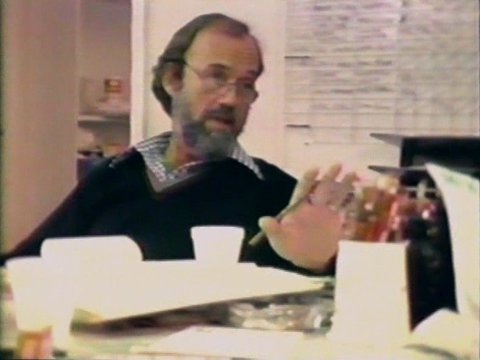
One often overlooked aspect of M*A*S*H was the actual editing of the film. One second took up a foot and a half of film. And it took an average of six working days to fully edit an episode. Stan Tischler, also an associate producer, worked on the pilot episode and stuck with the series for the rest of its run. Part of his job was to cut bits and pieces out of an episode to make sure it clocked in at the right length. If he was given an episode and told that three minutes had to be taken out, he had to find a way to take out those three minutes without hurting the episode.
Odds & Ends
Jamie Farr talked about “the gripe session,” a behind-closed-door opportunity for the actors to talk about any gripes they may have with the way their character is being written, the way the group is working together. The crew isn’t involved, only the cast. They can get together and talk about problems.
Mike Farrell then spoke of how the cast and crew are incredibly supportive. In his case, when he wanted to direct an episode he was allowed to do so and was helped every step of the way. When he wanted to write an episode he was allowed to, and the people at M*A*S*H had him write the episode alone without even realizing it.
“I get a lot of letters from people thanking us for making them laugh and cry at the same time. To me, that’s the best kind of drama, because that’s what life is. Life is enjoying it and wondering how you’re going to get through the next ten minutes, all at the same time.”
Alan Alda
To close out the documentary, Gelbart, Alda and Metcalfe talked about how the networks haven’t learned, despite the quality and success of M*A*S*H. The three agreed that the networks are too commercial and that the networks won’t take chances. Metcalfe actually came out and said that if M*A*S*H were a pilot under consideration in 1980 it probably wouldn’t sell.
Critical Reception
Mike Drew of The Milwaukee Journal called the documentary “a special treat,” “worthy of its subject” and “a fascinating view of one of television’s finest half-hours” [1]. The Hartford Courant‘s Owen McNally pointed out that the documentary was never critical of M*A*S*H yet noted that it “still yields an invaluable portrait of one of television’s most extraordinary programs” [2]. John J. O’Connor of The New York Times called it “an unusually illuminating glimpse into the processes of television” that “captures some of the pain and all the exuberance connected with ‘M*A*S*H'” [3].
In a March 1981 review The Pittsburgh Post-Gazette lavished praise upon the documentary, noting that it was “beautifully-crafted, so that you’re not stuck with a lot of talking heads” and referring to it as “an intense, rich portrait of one of television’s enduring series” [4]. “Making M*A*S*H” was nominated for a 1981 Emmy Award for Outstanding Informational Special but lost to a CBS special called “The Body Human: The Bionic Breakthrough,” originally broadcast in May of 1981.
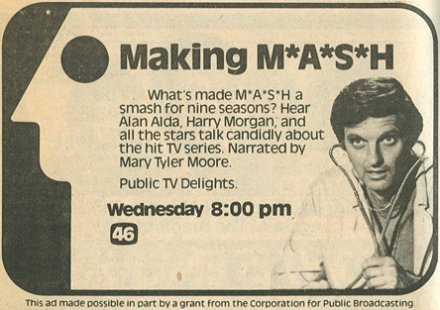
Special PBS measurements revealed that “Making M*A*S*H” averaged 17% of the viewing audience in four cities: New York, Los Angeles, Chicago and San Francisco. That was almost four times higher than the 4.2% typically drawn by PBS programming in those cities [5]. The documentary was repeated on individual PBS stations throughout 1981.
According to producer Michael Hirsh, part of the agreement made with 20th Century Fox to create “Making M*A*S*H” gave the production company the right to syndicate the documentary. Unable to come to an arrangement with Mary Tyler Moore for use of her narration, 20th Century Fox had Hirsh provide a completely new narration [6]. The syndicated version included commercial breaks and was edited for time. The original PBS versions runs approximately an hour and 28 minutes. The syndicated version, on the other hand, runs just an hour and 13 minutes. Exactly how extensively it was syndicated is unknown.
When the “Martinis & Medicine Collection” DVD collection was released in November of 2006, several M*A*S*H specials and retrospectives were included. “Making M*A*S*H” was not one of them, likely due to licensing issues; 20th Century Fox does not own the documentary (WTTW does) and would have to pay a fee to release it.
Works Cited:
2 McNally, Owen. “PBS Gives ‘M*A*S*H’ Grew Snappy Salute.” Hartford Courant. 21 Jan. 1981: B4.
3 O’Connor, John J. “TV: The Panoply of the Inauguration.” New York Times. 21 Jan. 1981: C23.
4 “Tonight in preview: Film speaks to dilemma of women.” Pittsburgh Post-Gazette. 13 Mar. 1981: 30.
5 Holsopple, Barbara. “‘Paper Chase’ Fails to Find Benefactor On PBS.” Pittsburgh Press. 2 Jun. 1981: B-19.
6 From e-mail correspondence with Michael Hirsh, July 2010.
Image Credits:
Published January 2nd, 2005
Last updated December 16th, 2015





My dad was in the service with Stan Tischler and I have come across many old photos. Is Stan still alive? Is there somewhere I can contact him?
Thank you
Susan Pobjoy
According to the Internet Movie Database, Stan Tischler is still alive:
http://www.imdb.com/name/nm0864300/
The only suggestion I have about trying to contact him is to post at rec.arts.tv:
http://groups.google.com/group/alt.tv.mash/topics
Larry Gelbart frequents the groups and may know how to get in touch with Stan. Good luck!
I’m dying to see or own this documentary. Does anyone know how I can get my hands on it?
Kelsey,
You can watch “Making M*A*S*H” online at the Museum of Broadcast Communications. Here are instructions I wrote up last year about how to find and view the documentary.
i want to put it on a DVD is there any way I can download it from Museum of Broadcast Communications?
Glad you like “Making M*A*S*H.” It was based in large part on my doctoral dissertation at USC and I have the sole researcher credit on the film. In the event anyone is interested in more and related information, the full title of my 1977 dissertation is “Television Comedy Studies: Creation and Production of The Mary Tyler Moore Show, All in the Family, and M*A*S*H.
Hello! Decades ago Michael Hirsh and I worked together in the world of radio and teevee. Unfortunately I’ve lost contact with him….would greatly appreciate assistance in reconnecting.
don kinney
Please tell him of my search! (e-mail address is included above)
Don,
I’m in Punta Gorda, Florida. Unfortunately, I can’t see your email address to write to you directly.
Hirsh
Saundra – I might need to contact you, I’m doing a chapter on my thesis on masculinity and have a chapter on M*A*S*H. I’ll need to hunt down your dissertation, cheers! If you fancy an academic exchange on the subject please don’t hesitate to shout out – [email protected]
cheers! Will hunt down your dissertation! Hopefully I’ll manage to get it here in England.
sunday
Hiya – what is presumably the syndicated version of this docu has been very kindly uploaded to YouTube :-):
http://www.youtube.com/watch?v=krfzNVE0xSo&feature=related
Btw Saundra McMillan, if you look in again, I would really love to read your dissertation – any way of seeing it online?
Best wishes,
Dene.
Hi, I’m doing my PhD and one of my chapters is on M*A*S*H focusing on Hawkeye, Winchester and Klinger. I’ve had a really hard time finding this documentary, cheers for the link for youtube, as the Museum of Broadcast Communications version won’t play!
If anyone has any ideas on how to get a hold of some of the writing crew please don’t hesitate to shout out! cheers.
sunday
Dino71 and Sunday:
My dissertation is available at USC: https://library.usc.edu/uhtbin/cgisirsi/?ps=yIcSWpDMdN/DOHENY/229700175/9
Also, should be able to order a copy from Ann Arbor repository. I think only abstracts are available online.
Have been meaning to donate a copy and my research interviews and materials to my undergrad university, University of Missouri, since I retired back here; will do so soon and request that they provide interlibrary loan. Hope it will work; will post here if they will.
Re contacting writers: try contacting WGA to get the agents’ names and numbers for folks still around. Take writers’ names from your favorite episodes. In case you didn’t know, sadly, Larry Gelbart died not long ago.
Mike Hirsh:
Hi! Sorry, it never worked out at CSULB. Crazy department. I retired as soon as I could and have been restoring land and building my earth-sheltered dream home. . .and writing a bit.
Hi, Saundra! I’ve got a copy of your dissertation and it will be helpful for my chapter on MASH, cheers. Was devastated when Gelbart passed away, as well as Henry Morgan.
Quick scholarly questions for you, though, if you have a bit of time. Any way you could email me at [email protected] so I could ask you a few specific questions for my chapter?
The YouTube video is dead!
I have tried all the popular video downloaders and none of them worked. (Over 30 so far). They are all based on URL, and pretty much the same. So I doubt any will work.
Has anyone been able to download the video from the Museum website?
Please post how you did it! I have waited since I seen this the last few minutes on PBS to see the entire thing, and its killing me!
When I do, I’ll let you know.
M*A*S*H was and still is for me a resource for survival in the toughest of times. Who would think that a TV show could save lives far from actual shelling?
When you lose the life you had, and face years of wondering if you will at least have some better life than what you’re now stuck in, you need role models — how do you handle the loss? The added humilliation of the stupidity of bureaucracy? How do you breathe?
I am grateful that I grew up in the time of M*A*S*H because I had those answers: If I can still laugh, it means I am still breathing; if I am still breathing, it means I am still alive.
If I am still alive and still breathing, then it still beats the alternative.
If I can’t still laugh, then I should wait a few days — it probably just means I’m hormonal.
And I owe M*A*S*H that wisdom, too, because nothing was funny — not even reruns I previously loved — when I was hormonal, so I learned early on to have rules:
Rule #1: Don’t make any decisions if you think M*A*S*H isn’t funny.
(I suggested this to my Congressman, but I think he thought I was joking.)
I’ve spent years getting to the point I can feel like I’m moving in some direction. I’m writing, and I owe a lot of how I can face these things and tear the world apart and examine each piece — and see both the important truths and the humor in the most dire situations — I owe that to M*A*S*H.
Maybe I’m not famous, or even self-sufficient (yet), but I have a goal* that may get me there and bring out truth and awareness and a even a few laughs along the way. And if I don’t make it, or if — God forbid — there’s some other freaking setback or roadblock or I drop dead, the road was a lot better, for me, and I like to think, for the other people I met along the way, because of the work these folks did.
Thank you
*The goal is: I’m writing a collection of short fiction about folks moving forward through injury, illness and life upheavals. It’s taken a lot of study about Rhetoric to focus my writing so my stories don’t fall into the stereotypes of horror or triumph, but address real issues, the way M*A*S*H did, but instead of an operating room, you have the kitchen table, a major uncrossable intersection, or the bathroom mirror.
When I finish the book, maybe I can get into a grad school and they won’t laugh at me for being almost 50. Maybe I could teach at a college when I get out. Maybe I could go on the road and read and start dicussions with my stories.
So I’m dreaming, but I wouldn’t be without the guidance I had all those years ago. You all raised me to keep going…Thanks again
So is there any way to actually watch this anymore? Youtube video was deleted and the museum site has changed.
I’d love to watch it if anybody could help. Thanks!
What are all the actors doing today ? Who are still living and who has passed away ?
I will only add here that Alan Alda, Mike Farrell, Loretta Swit, Gary Burghoff, & Jamie Farr are the main cast members still living now. You can probably find out what they are all doing now if you just search the Internet for their names.
It was SUPPOSED to read:
“If I can still laugh, I know I am still breathing.
If I am still breathing, I am still alive. If I am alive and still laughing, it still beats the alternative.”
Brain injury. Gotta love it.
Update: Am so delighted – someone gave me tickets to go see Alan Alda speak on the 8th in Pittsburgh – Yippiiiii!
Am happier than Hawkeye Pierce getting the copy of Life Magazine featuring Cabbot Cove!! 😀
Angelle, that’s “Crabapple Cove”. The only fictitious town name used in the original film. ( And, I believe, the series ).
I’m fortunate to have made a VHS recording of this when it aired, or perhaps on a re-airing in the mid-1980’s. Now preserved on a DVD I burned. I watched it last year. Unsure, having read up on it recently, if I have the orginal 1:34 broadcast or the slightly cut down syndicated version.
Wish it were made available publicly. I’m a very strong proponent of copywright and so while I have a privately recorded copy ( protected by Supreme Court decision on home recording ), I cannot make copies or provide any material from it.
Seek, seek, it is out there somewhere !!
Thank you, for the correction – I was most certainly happier than Hawkeye receiving a copy of Life Magazine featuring “Cabbot Cove,” and maybe even happier than he was receiving the one about “Crabapple Cove.”
So glad there are folks who know these things – it is a special show, worthy of remembering properly!
Good news – there is a downloadable copy of the original MTM version available
http://www.uloz.to/xWU7tNU/making-mash-tvrip-1981-wmv
When I went to hear him at the Speakers Bureau, he told a story about a kid, a girl who wrote a letter that somehow got sent to his house. In it, she was contemplating suicide.
He said, he was deeply troubled by it – the letter had taken months to reach him, he wondered if she were already dead. In struggling to reply, he didn’t know if his response could create more trouble if her mother were to intercept it. He did the best he could, even sought help in answering it, so he wouldn’t make things worse.
But then another such letter arrived at the mail room from someone else, and another – lots of kids and grownups writing to him, as if he had all the answers – too many to reply to.
He decided the best thing he could do was to reply in doing the work he was doing. But he always wondered about that girl.
The truth is, I don’t know if I sent that letter. (Brain injury – information retrieval issues).
But I could have.
I had gotten his home address from a very famous Las Vegas comedian my grandma was a housekeeper for. I didn’t know the guy from Adam – we didn’t have internet back then, his show wasn’t on TV where I lived on the opposite end of the country, and if it were, I wouldn’t have been allowed to watch it anyway.
It’s important to know that he didn’t just hand it to me because I asked. When I was 11, I had discovered Alan Alda was not just an actor, but had actually written many of the shows. I was trying to write a novel – worked on it everyday at lunchtime when the other kids were out playing and I didn’t know any other writers. It was very lonely work and so it was exciting to see one, living and breathing, and acting out what he’d written.
So, when I went to go see my grandma that following summer, she takes me to see this comedian. That poor, poor, man….
He’s sitting up at the bar in his den, not well and getting more not well. I jump up on the bar stool next to him, and this guy – this ultra famous, like apparently second-only to Johnny Carson, comedian – taking a sip of his poison, asks me:
“So who’s your favorite comedian?”
Without hesitation, eyes and face enthused with heartfelt admiration, I reply, “Alan Alda!”
He nearly choked on his drink, and I thought he was going to fall off his chair with a heart attack.
Absolutely incredulous, he asked, “Why HIM?!”
And I told him how much the show meant to me, about my crazy family and being bullied at school and all the other things that weren’t right, how it helped, when life seemed like a war zone to see others surviving it and still keeping a sense of humor.
I told him about my novel and how much it meant to see this real writer on the TV, how it kept me going when the writing was lonely, that I was lonely anyway because there weren’t kids interested in the things I was, and seeing someone like that gave me hope that there were others out there, and when I grew up, I’d find them through my writing.
He remembered he had to go take care of some things and left, but as my grandma and I were leaving, he palmed me a piece of paper.
It had Alan Alda’s name and an address on it that wasn’t in California.
Thing is, my dad’s work put him in touch with a lot of people. A lot of people are crazy, and any letters or cards from his clients that made it to our house were always seen as overstepping the boundaries.
I didn’t want to do that with Mr. Alda. If I wasn’t introduced, I didn’t want to intrude.
More, I figured he had kids, and my dad had so little time, I wouldn’t have liked it if some other kid took up his time trying to be his pen pal.
So I took this little pocket magnifying glass I had, and the next morning, out in the parking lot of my grandma’s building, I burnt that piece of paper with the address, so I wouldn’t be tempted later.
Thing was, I did write to him – probably hundreds of letters – the way girls usually write, “Dear Diary.” Stuffed them behind the loose molding in my closet, between the plaster and lathing wall and the brick. Until my mother found them and ripped them all up. Along with most of my novel.
I hope I didn’t remember or track down Mr. Alda’s address. I am persistent enough of a researcher, that even at that age and before internet, I am sure I could have found it. My teenage self was nowhere near as intelligent as my twelve-year-old self, and life got to be even more challenging. I know I THOUGHT about actually sending him a letter asking advice, but I hope I didn’t.
What I do know at this point in life, is that I was not alone. There were thousands of us being raised by Mr. Alda, looking to him for advice and comfort. Am sorry if I did.
What I would say to him if I could would be you did the right thing – thank you for raising all of us through your work, teaching us to survive the challenges in life with compassion and humor.
My favorite episode was the one where I became the wounded person. I learned alot from it and felt alot of emotions. Thank you so much for M*A*S*H*>
I managed to watch the Mary Tyler Moore version of the documentary. I’m not sure it’s completely accurate, given Moore states at one point the show had little interference from censors but in my research (and from Gelbart’s autobiography) I know this isn’t true. Still, it’s good to get so many members of the cast and crew together. It’s a shame it’s never been released. I have the complete boxset which includes the 30th Reunion but no Making MASH which I find very odd.
If you work-in the desert, before you hook them up tto examining your boots for scorpions becomes second nature.
That can do this ffor you, even better if you can locate a retailer
in your area or another location. http://tomq.al/peoplewouldnt39889
Fed up with using various products that provide
no consequence, regardless of how challengingyou push? Ultimate Testo
Explosion twofold the workout’s effect and can be anextraordinary supplement to aid your muscle.
It’s Only overthetop exercise enhancer that providetheideal wellness to
you that you simply pine for. All-the nutrition that you could get and a significant
diet program may helpyour way of make the body as anextreme weight lifter.
This product will give you all diet program and
theimportant nutrition alongside a good exercise to create an exceptional body.
This can be a dietary supplement which assists when compared with the typical
method, the musclecreate and make use of a quickerprice.
A muscle grows oncewe work-out it tears and next steadily the proteinsmends up them.
This action of deterioration and afterwardadjusting makes their muscle develop.
Thispiece has regular testosterone, which helps in quickening thisretrieving
technique andaccordingly improving muscle better and. Expanding
the levels of testosterone within the body thisitem forms of repairing in the torso in just a portion of the time, thisprice your body recaptured
from your fatigue.
read more — >visit here
I’m trying to find a copy of “Making MASH. Is it available anywhere?
I’ve been digging around the internet and have come up with nothing.
Thanks for any help.
as
I managed to find a copy when I was writing my dissertation, the original Mary Tyler Moore version. I’ve posted it to my M*A*S*H facebook page for a limited time (as I don’t want to get into trouble over copyright). It will be on there until the 23rd. I would offer to email you a copy but it’s a very large file and I can’t remember the site I got it on for the life of me. The facebook page is called M*A*S*H Franchise
Fact be instructed, there are a variety proposed solutions out there assist you stop snoring. Some have more potential than others but actually it is dependent upon you, and just how unhealthy your evening breathing problem is. We now have uncovered alternative routes to cease loud night from as far out as hypnosis to loopy concoctions of ingredients in tea. That mentioned, the the following different snoring cures usually tend profit the typical snorer.
Meilleur bruleur de graisse femme 2018 http://demo.qa-themes.com/support/index.php?qa=ask
˚ݼʿ`ѩ`ԩ`,֥ɥԩ`åȥեå, ֥ɣ֥ `ѩ`ԩ` NNϥ`ѩ`ԩ`֥ɷäǤ⤢롣`ѩ` ԩ` Ʒ| 륤ȥ ԩ` ,ͥ ԩ` ,å ԩ` , ԩ` ,ץ ԩ` ,ߥ奦ߥ奦 ԩ` , D , ԩ` T LTĥԩ` å¥å ԩ` ,` ֥.
ץ`Tĥԩ` http://forum.bikenet.nl
2019:ͥiPhoneXS`|ȥiPhoneXS`:ͥiphoneXS`֥|ȥiphoneXR`֥|åiphoneXS `֥|ͥiphoneXS MAX`֥|ȥiphoneXS/XR֥| åiphoneXS/XR֥|iphoneX/XR`֥ȫƷ|.֥iphone`ԩ`ͥiphone`ԩ`.
֥Я`ԩ` http://www.ccwproducts.com
https://youtu.be/jiFqjhSY0mA
Making M*A*S*H copy date? The above link shows end credits look to be 1984 or 1986 not 1981
Like dogs and cats, the internal body building of a cat has a
naturally structured endocannabinoid network. For
this reason, your cat will encounter various health advantages from naturally-occurring CBD.
However, as with cats and humans, CBD may be subject to certain side
effects. That is why it’s important to purchase cbd oil for cats from
a trustworthy and trustworthy source. In this brief article, we are going to discuss how CBD works, and learn more about the numerous health benefits of CBD for cats.
I have a copy of the Making M*A*S*H special (about 90 minutes long), and I’d be glad to share it with anyone directly. There may be some copyright issues with posting it on Youtube. Email me at colten dot wescott at gmail.